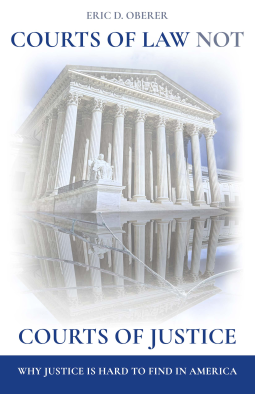
Courts of Law Not Courts of Justice
Why Justice is Hard to Find in America
by Eric D. Oberer
This title was previously available on NetGalley and is now archived.
Send NetGalley books directly to your Kindle or Kindle app
1
To read on a Kindle or Kindle app, please add kindle@netgalley.com as an approved email address to receive files in your Amazon account. Click here for step-by-step instructions.
2
Also find your Kindle email address within your Amazon account, and enter it here.
Pub Date 11 Apr 2023 | Archive Date 13 Mar 2023
Talking about this book? Use #CourtsofLawNotCourtsofJustice #NetGalley. More hashtag tips!
Description
What if I told you that the American criminal justice system has never been about, is not set up to seek out, and is not equipped to find, justice –- at least “justice” as understood by most? In many ways, it was designed this way by the Founding Fathers based on Benjamin Franklin’s vision that “it is better a hundred guilty persons should escape than one innocent person should suffer.”
Americans are taught that justice means fairness. They expect it from our legal system. “Equal Justice Under Law” is prominently inscribed on the Supreme Court. Yet law and justice in America are not necessarily the same thing. And they are certainly not applied in equal ways.
The disconnect between these realities and what Americans are taught about justice has led to great strife in our society. But what if everyone grew up understanding the limitations of our justice system, yet understood what it is striving to achieve? Through the Revolutionary War, historic cases, civil unrest, Broken Windows law enforcement, corrupt police and attorneys, and jury bias, the lens through which you see the American justice system is about to change, all as told by former Baltimore prosecutor –- Eric Oberer. It is time for a paradigm shift…
A Note From the Publisher
Eric received his Juris Doctorate from the University of Maryland Francis King Carey School of Law and a Bachelor of Science in finance from New Jersey City University, where he was president of his class and named the Thomas M. Gerrity Scholar-Athlete of the Year for NCAA tennis. Eric currently serves as a member of the board of directors of the Maryland Land Title Association and chairs its underwriter section as well as the committee on education. He also chairs a committee within the Maryland State Bar Association. Eric is licensed to practice law in the State of Maryland and the District of Columbia and is a member of both the Maryland and Washington, D.C. Bar Associations.
Advance Praise
“Courts of Law Not Courts of Justice, rather than picking a side, reveals dark aspects of our criminal justice system when viewed from a variety of angles. Highly engaging, thought-provoking, and easy to read, Mr. Oberer has provided us with an exposé worthy of the read.”
—Patrick Daly, Former Maryland Assistant Attorney General & Maryland Assistant State’s Attorney
“I’ve known Eric since we were children, the time when we became friends. We remain friends in adulthood. He has always been a person who has lived his life with integrity and strong moral principles. He has always had many concerns about the hardships that others have faced and wanted to help change the conditions of all people, especially those individuals that live in poverty-ridden areas. As someone who spent large portions of his childhood in high-crime White areas as well as high-crime African-American areas, in addition to having been a guns, drugs, and violent crimes prosecutor in Baltimore, I believe that Eric is uniquely situated to provide keen insights into the American justice system. As the Principal of an inner-city charter school for at-risk youth, each day, I see firsthand the impact that the justice system has on society and the significance of the perceptions and realities of the justice system on the lives of many. Courts of Law Not Courts of Justice provides an inside look at how the justice system operates in America and ought to be considered required reading for anyone that wants to know how things work.”
—Terrell S. Williams, Principal, Riverscape Career Tech High School
“Eric Oberer boils down complex legal rulings and theories in a thorough yet understandable manner. His descriptions of these fundamental American rights help the reader to appreciate the many legal and political issues in the news today. Courts of Law Not Courts of Justice is a valuable tool for understanding the issues of our day and the events that led to them.”
—Michael N. Russo, Jr., Partner, Council, Baradel, Kosmerl & Nolan, P.A.
“Courts of Law Not Courts of Justice should be a required text for all law students but will easily be enjoyed by all readers interested in our system of justice. The book presents an incredibly articulate and cogent critique of the American criminal justice system. Mr. Oberer’s work provides the historical context for understanding how well-intended political policies dealing with crime coupled with inadequate public resources can result in the inconsistent and deficient dispensation of justice throughout our legal system.”
—J. Paul Rieger, Jr., Attorney and American Author
“Courts of Law Not Courts of Justice is necessary reading for anyone concerned with the urban criminal justice system or affected by it. This is truly a book for all people and highlights the circumstances in a clear and direct manner. The author thoughtfully and in-depth describes the criminal justice system in urban areas and nationally, providing the background, causes, and shortcomings. It clearly describes our current circumstance and how we got here.”
—David M. Kochanski, Partner, Shulman Rogers
“Courts of Law Not Courts of Justice is a clear, concise primer on our criminal justice system—a system designed to provide individuals with fundamental protection of their freedoms, but which is straining at the seams to do so. Unrelenting dockets, policing practices, self-interested actors, and political pressures combine to undermine trust and render the system unable at times to dispense justice to defendants. Attempts to blame the justice system as a scapegoat for failing to provide ‘social justice’ often result in frustration boiling over into anger. Much of the misconception of our justice system stems from failure to understand its purposes, its goals, and its limitations. This book is a welcome first step toward a clearer understanding of the justice meted out by our courts.”
—Bryan McGahan, Senior Underwriting Counsel, First American Title Insurance Company
“Eric Oberer delivers a captivating introduction to the American justice system. For all who wonder why they don’t see justice being served, he answers that question with a timeline of important criminal and constitutional cases that help the reader understand that the law does not always mete out justice. The organization and presentation of landmark Supreme Court cases is perfect for law students and beginning attorneys in the criminal justice world to help them understand the current state of the U.S. criminal justice system with all of its virtues and faults.”
—Joe Alfandre, Attorney, Snell & Wilmer, LLP
"An enlightening book about the criminal justice system in the United States and shows how it affects every citizen"
-Literary Titan
Marketing Plan
Reading and event opportunities (live and virtual)
Book club selection
Goodreads giveaways
Social media outreach and ad-buys
Kirkus, Publishers Weekly reviews
Publications/newspapers/book bloggers contacted for reviews, interviews, and features
Guest on radio and podcast shows
Available Editions
| EDITION | Paperback |
| ISBN | 9781639887620 |
| PRICE | US$18.99 (USD) |
| PAGES | 188 |
Featured Reviews
 Janalyn P, Reviewer
Janalyn P, Reviewer
In this book the author explains how our court system is it really set up for justice but actually follows a strict list of rules that doesn’t always equal fairness. The first half of the book is historical court cases that have our most essential rights such as our Miranda rights our rights to a lawyer and many more but then further in the book he goes to explain his main premise of how these are courts of law and not courts of justice. Although we strive hard and theory to make sure everyone’s rights are protected it is true that court or more lenient to those with oodles of money as a post to the poor. I am only thankful that I had an uncle who was the town sheriff and his brother Tosh who was the town judge NBA were overly sensitive to being kind to the less fortunate of any color. They were a great example Ronaldo to man cannot solve the worlds problems I am thankful I come from people who also didn’t contribute to send issues. I love this book and totally agree with that and although I was a little thrown off with the court case about the Vory driver… Only because we Do Not Dr., Lori‘s in America or at least that isn’t what we call them. So at first I thought I was reading a book about Britain’s judicial system I was quickly disavowed of that notion and just thought I would mention it here. I did love this book and thought it was greatly done and I love the way without bias he told the story then let the reader make up their mind that is the mark of a truly talented author I really enjoyed this book and highly highly recommend it. I received this book from NetGalley and atmosphere press but I am leaving this review voluntarily please forgive any mistakes as I am blind and dictate my review.
Courts of Law Not Courts of Justice brings an extremely enthralling introduction and supreme court cases to his readers explaining the US criminal justice system with all of its morality and flaws. This book is an informative read for law students and attorneys in the criminal justice world to understand the present state of the American Justice System. Eric D Oberer, an experienced former prosecutor in one of the most violent and highest crime cities in America, Baltimore, Maryland explains in his book why justice is insuperably difficult to achieve in courts of law in this country. When people in America expect fairness, recourse, justice, and peace from the American criminal justice system, the system itself is not meant or designed to find justice but frustrates them. Many important protections were included among the first fourteen amendments to the United States Constitution for the reason which lead to the violent overthrow of oppression of the tyrannical King of Great Britain that terrorized the North American colonies in 1776. It is surprising that justice is rarely found in the US courtroom, therefore many citizens take the law into their hands. The author has brought to light the complexities of the US criminal justice system of law first existed greatly keeping in mind the concern to protect innocent people changed with crimes they did not commit. The author also educates and discusses with his readers the definition of rule of law by the World Justice Project (WJP) Rule of Law index as a durable system of laws, institutions, norms, and community commitment that upholds four universal principles: Accountability, Just laws, Open Government, Accessible and Impartial Dispute Resolution.
The author has highlighted also unjust policing tactics, police brutality, misconduct, racism, and discrimination. Harlem Riots 1964, Tampa Riots 1967, Camden New Jersey 1971, Queens New York Riots 1973, Houston TX Riots 1978, San Francisco CA Riots 1979, Miami Riots 1980, Miami Riots 1989, Los Angeles Riots 1992, Cincinnati Riots 2001, Oakland Riots 2010, New York City Riots 2014, The Missouri Riots 2014, Baltimore Riots 2015, Nationwide protests & Riots 2020.
The author further explains Disparities in Justice and the Broken Windows Theory quoting:
"The criminal is to go free because the constable has blundered?" - Benjamin Cardoza, New York Court of Appeals Judge (1914-1932 and late Supreme Court Justice (1932-1938); People v Defore, 242 N.Y 13 (1926)
"The criminal goes free if he must, but it is the law that sets him free." - Mapp v Ohio, 367 U.S 643 (1961)
The author teaches a handful of famous criminal cases which helped me being a legal professional to understand which are important to review in providing justice arising from the Fourth, Fifth, Sixth, and Fourteen Amendments.
I just reviewed the book, Courts of Law Not Courts of Justice, by Eric Oberer, Thanks to NetGalley and Publisher Atmosphere Press for an advance copy of my honest Review.
 Reviewer 284405
Reviewer 284405
Justice and fairness are not necessarily the same things. This book brings to light the problems with the court system. The author also focuses on laws and ideals within the system that cause more issues than solutions. I feel like the court system as with many other helpful government entities are broken beyond repair

















